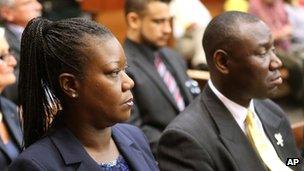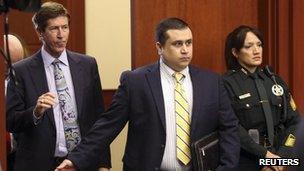Trayvon Martin texts and tweets limited in Zimmerman trial
- Published

Trayvon Martin's mother wants to see a fair trial, her spokesman says
A Florida judge has limited the evidence defence lawyers can use in the trial of a neighbourhood watch volunteer who shot dead an unarmed black teenager last year.
Details about slain 17-year-old Trayvon Martin's cannabis use, school suspension and fights cannot be used in opening statements, the judge said.
George Zimmerman's lawyers argued those would show he acted in self-defence.
Mr Zimmerman has pleaded not guilty to a charge of second-degree murder.
In Sanford, Florida, Circuit Judge Debra Nelson also refused a request from the defence to delay the trial, now scheduled to begin on 10 June.
"We have a lot of evidence that marijuana use had something to do with the event," said Mr Zimmerman's defence lawyer Mark O'Mara.
"It could have affected his behaviour.''
'Attempt to influence'
Neither side will be allowed to mention Martin's alleged role in fights, nor his drug use, nor other allegations pertaining to his character in their opening statements, the judge ruled.
But she allowed that some of the evidence and testimony about it could be permissible later, depending on how the trial progressed.
Last week, Mr Zimmerman's defence lawyers released to the public text message exchanges from Martin's mobile phone in which he appeared to discuss fights, a suspension from school, marijuana use and possibly buying a gun.

George Zimmerman has said he thought the teenager was trying to grab his gun
After Tuesday's hearing, Benjamin Crump, a lawyer representing Martin's family, said the personal information about Martin was "not relevant" and "inadmissible" as evidence.
"We think it was strategic when this information was released after the jury summons went out," Mr Crump told reporters.
"It was calculated, we believe, to sway and pollute and influence the jury."
Also in Tuesday's hearing, the judge said she would not allow jurors selected for the case to travel to the scene of the shooting during the trial.
The panel will not be sequestered during jury selection either, although defence lawyers argued such a measure would be necessary since the case has a high public profile.
In February 2012, Martin was walking from a shop to his father's home when the deadly confrontation with Mr Zimmerman occurred.
'Stand your ground'
Mr Zimmerman had been sitting in his vehicle watching a neighbourhood street when he saw Martin and deemed him suspicious. He telephoned authorities, then left his vehicle to pursue Martin.
Florida police did not arrest Mr Zimmerman for six weeks after the shooting.
He has denied he intended to shoot Martin, claiming the teenager became aggressive and threatened him and that he drew his legally carried gun and shot in self-defence.
The case drew national attention because the state's controversial "stand your ground" law grants individuals wide latitude to use deadly force if they feel seriously in danger.
Mr Zimmerman's lawyers have opted not to cite that law in their defence.
- Published12 April 2012
- Published12 July 2013